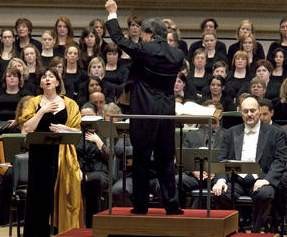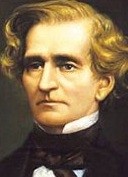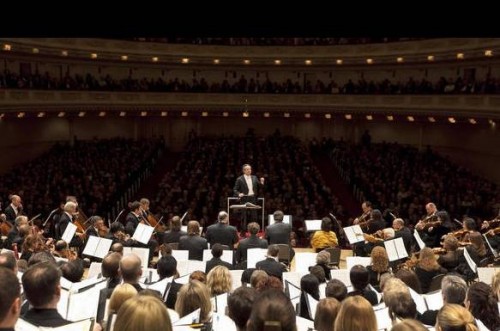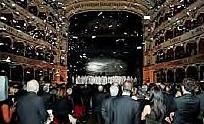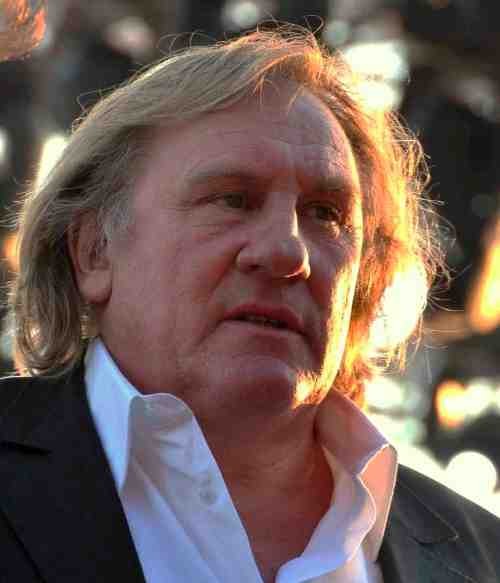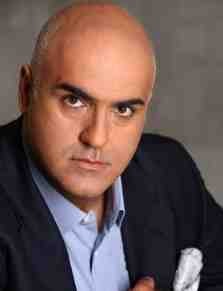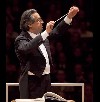Muti and Chicago Symphony Storm Carnegie
The Battle for Berlioz is Joined
By: Susan Hall - Apr 18, 2011
Riccardo Muti, Music Director and Conductor
Chicago Symphony Orchestra
Carnegie Hall
April 16, 2011
Hector Berlioz, Symphonie fantastique
Hector Berlioz, Lelio
Gerard Depardieu, Narrator
Mario Zeffiri, Tenor
Kyle Ketelsen, Bass-Baritone
Chicago Symphony Chorus
Duain Wolfe, Director
www.carnegiehall.org
Like Hector Berlioz, a composer whose work he led on Saturday evening, Riccardo Muti is a particularly passionate conductor who believes in the healing power of music. A young French horn player, a member of the Chicago Symphony, which Muti plans to take around the world bearing this message, was reverent in her remarks about the Maestro. “Quite unlike anyone else,” she said, “he cares so much.” Muti can engender this response in listeners and young people for whom music brings hope in our troubled world.
In March, Muti asked the audience at the Rome Opera to stand and sing a once-in-a-lifetime encore of “Patria Mia,” the unofficial national anthem of Italy from Verdi’s Nabucco. This was a protest against the Berlusconi government for failing to support the arts.
Muti has led an orchestra of six hundred fifty young musicians from Italy, Croatia and Slovakia before an audience of 10,000 including the Presidents of all three countries. He has received almost as many awards for his public conscience as he has for his musicianship.
Berlioz’ Symphonie Fantastique was received well by its first audiences, with the exception of critics who Berlioz wrote were ‘polluting the Parisian air.’ In Lelio, a musical monologue which Berlioz composed as a conclusion to the symphony, he writes: "Critics are like birds that soil the statues of Olympian Gods in the public gardens."
One critic, Fetis, was so nasty that Robert Schumann, a critic as well as a composer, wrote asking for a score so that he could see what the fuss was about. Schumann, ever fair, ran Fetis’ piece and then wrote extensively, brilliantly and with insight about a symphony he enormously admired.
In Muti’s hands, the Symphony was fresh and current. Remembering that it was first performed almost two centuries ago it is easy to forget that orchestral colors so beautifully summoned by the symphony -- from the bells, horns, the tam tam and multiple harps-- were revolutionary when Berlioz first used them. So too the harmonic tones performed to drive a story Berlioz cared so much about conveying that he passed out program notes before each performance.
Lelio is seldom performed. Referred to as an outré piece, audiences have always loved it, as did Berlioz himself. Standing back stage he would watch Liszt play the piano part and Madame Pohl, the wife of a critic, make the Aeolian harp into a "potent frisson."
In the Carnegie performance, the hall went dark, with a muted spot on the conductor, and a more full one on the French actor Gerard Depardieu, narrator for this performance.
Songs were sung by Mario Zeffiri, a rich tenor and Kyle Ketelsen, a bass-baritone of unusually full voice. Berlioz wove five songs together to work as a whole.
As Berlioz, Depardieu composes the piece before us, commenting constantly. Toward the end, his mood brightens and he orders the orchestra to begin, again and again. As he walks down steps to exit the stage, he turns back to the musicians and tells them they can go onto more consequential music. The audience laughed often, an unusual pleasure in the concert hall, but one that goes along with Chicago style, an open and warm interface between performers and their audiences.
The Chicago Opera chorus, under Duain Wolfe is as wondrous as the orchestra itself. A trumpeter who was tucked in under the first chorus line for Otello on Friday night, found comfort in his nest. He was wandering around Carnegie on Saturday evening, meeting and greeting.
The raging winds and rains that brought us to the doors of Carnegie were probably just the kind of storms that brought Otello back to his Desdemona the night before. Muti put on a concert version of Verdi’s opera that rivaled anything mounted as a fully staged production. The violence of nature evoked in the overture was terrifying.
Aleksandrs Antonenko, the Latvian tenor who has made his mark this year in Boris Godunov, although he called in sick, performed without a glitch, his extraordinary voice tinged with an edge which makes him a perfect Otello. Krassima Stoyanova, with a deep, dramatic lyricism emanating from back of her throat, is a gorgeous Desdemona.
The Chicago children’s chorus slipped in to accompany Desdemona in the second act. They are scheduled to tame Rahm Emanuel when he is inaugurated as mayor of Chicago in May.
Every opportunity to share Muti’s extraordinary, healing musical journey is well worth taking.
Listening to him conduct the Chicago Symphony reminds us of the Victor Hugo phrase Berlioz attached as the epigraph to the Symphonie Fantastique: The heart's book is inscribed on every page.

